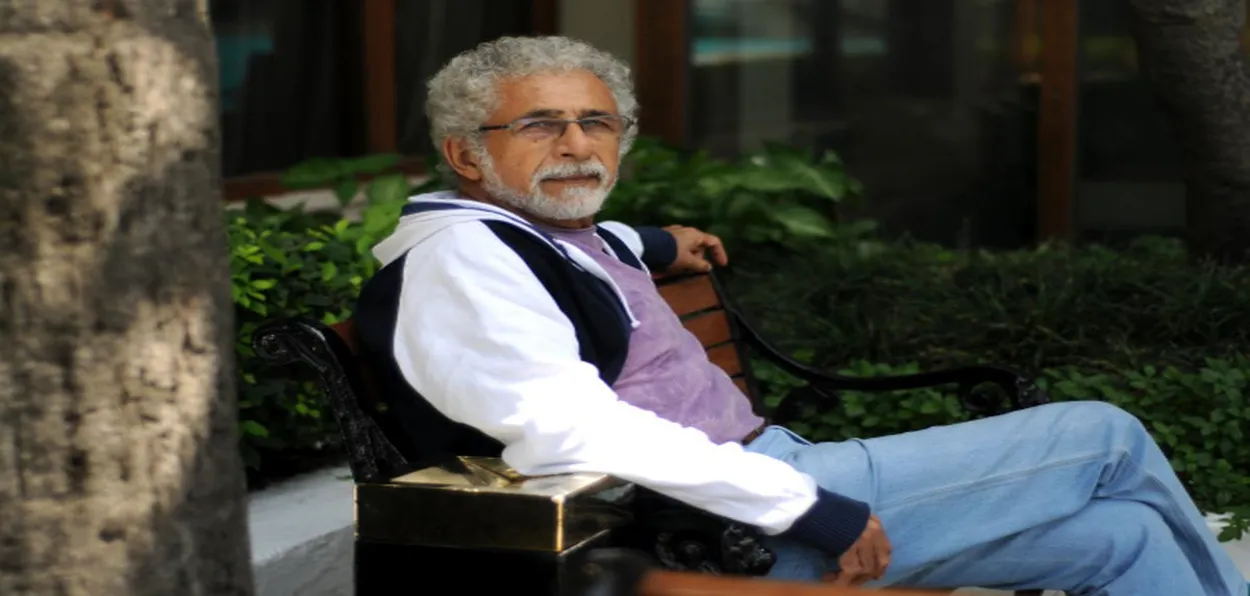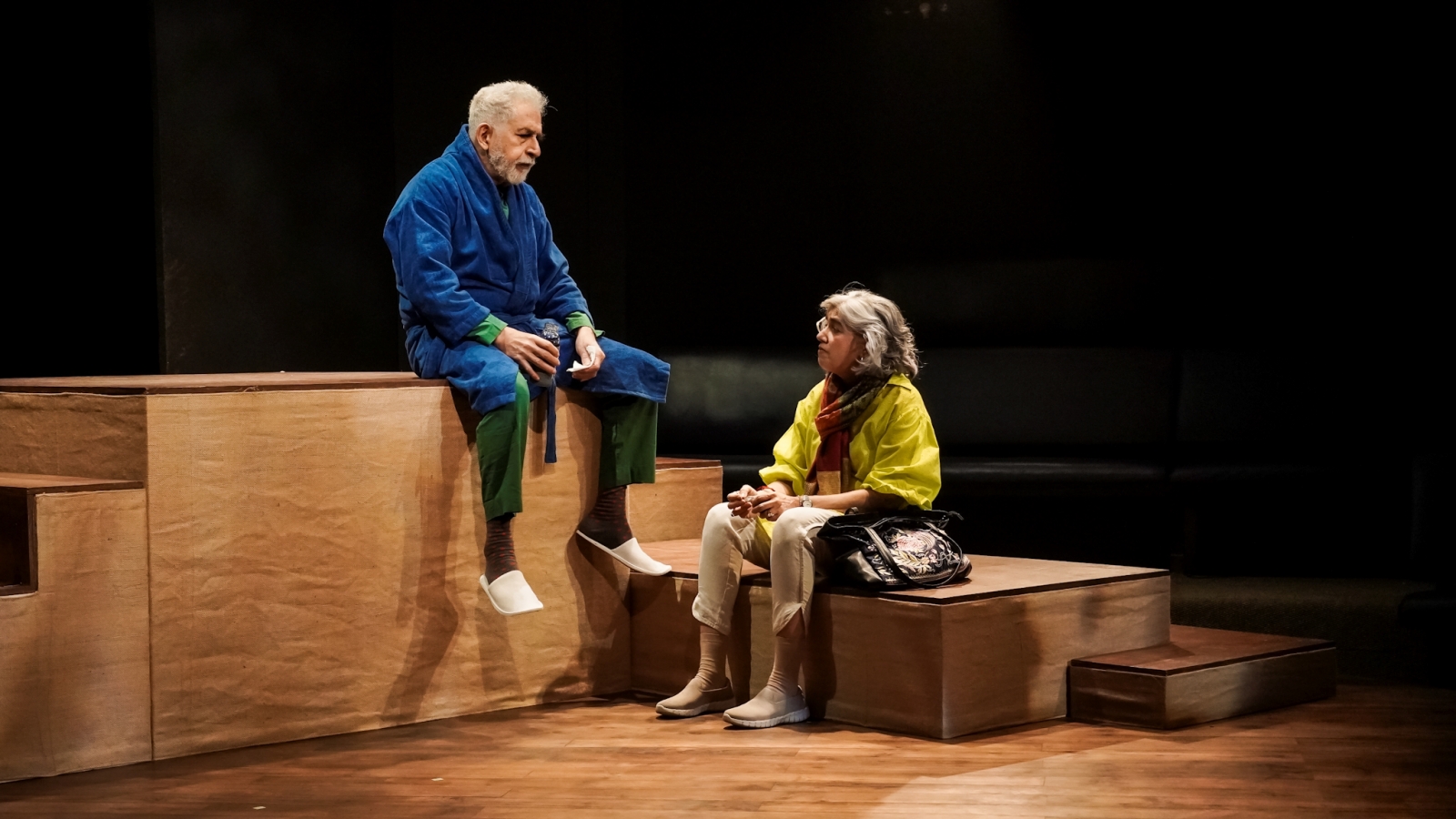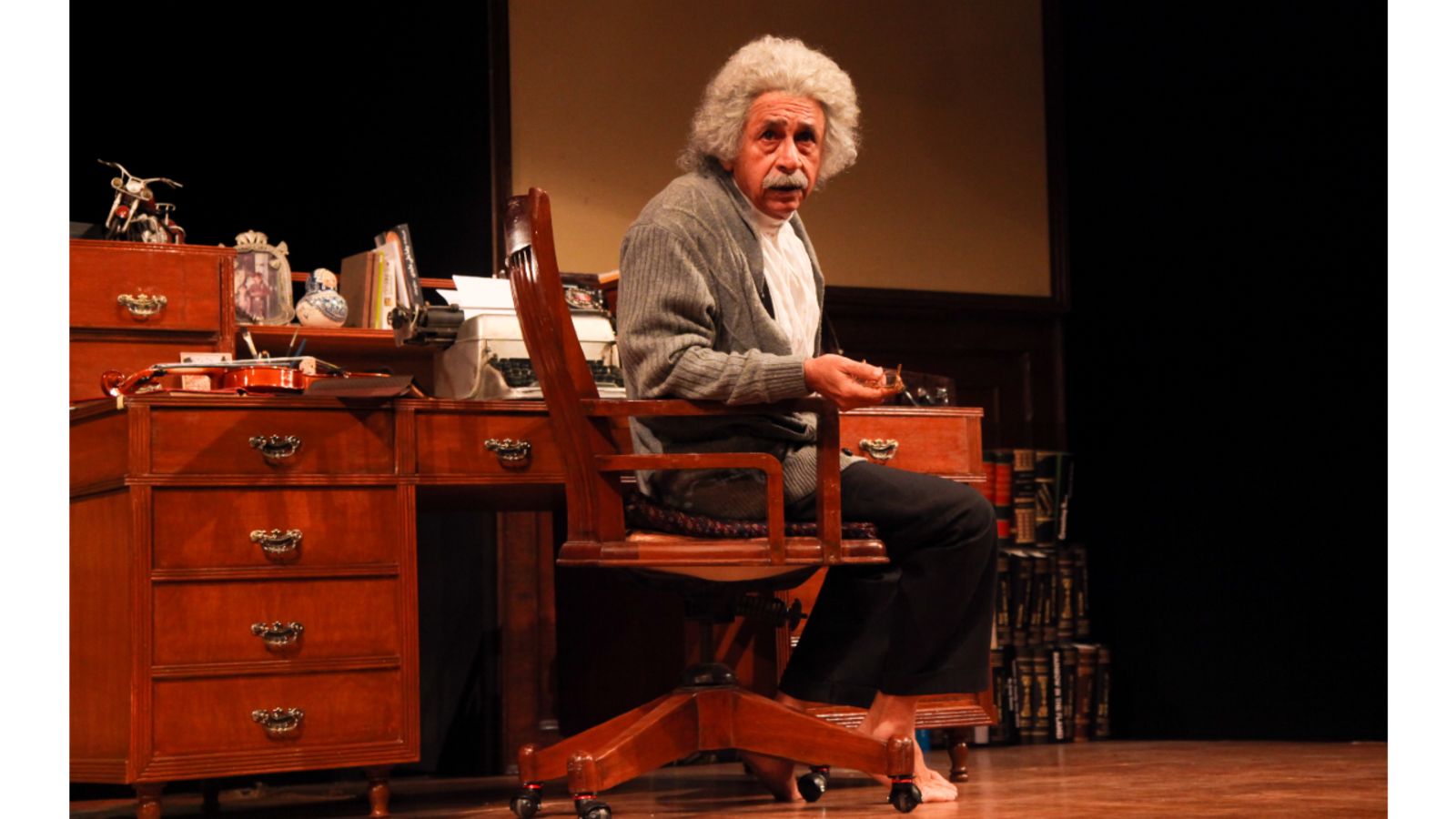
Rana Siddiqui Zaman/ New Delhi
An actor by heart is never contented; the day he is, he is dead. So they continue acting, thus normalising the unhindered naturalness of their skills on stage and in cinema. Naseeruddin Shah is one such actor.
And then, there are two kinds of actors, one, who has bitterly learned to live with the fact that not all audience are educated about ‘theatre watching etiquettes’. Therefore, they are barely bothered about how they behave while watching plays. And there are others who get offended, hurt, and disturbed. It wonders why it takes ages for certain audiences to realise that watching cinema and theatre are two different things. In the former, they can talk/whisper without annoying the actors and in the latter, they can potentially spoil it!
One remembers Naseeruddin Shah lost in an engaging scene from an English play he does with his immensely talented wife Ratna Pathak Shah titled Dear Liar.in New Delhi. The intense play has long dialogues, meticulously orchestrated pauses, steps back and forth, indications of deep breath, annoyance, hilarity, and much more in just one scene. While playing this scene, Shah and Pathak were suddenly disturbed by a loud telephonic conversation a man slipped into, as if he was in his living room.
 Actors Naseeruddin Shah and Ratna Pathak Shah in a scene from the play ‘Old-World’.
Actors Naseeruddin Shah and Ratna Pathak Shah in a scene from the play ‘Old-World’.
Shah stopped the play and stood cross-legged, like a listener to the conversation! The pin-drop silence in the auditorium gave way to murmurs. Everyone started looking at Shah and the man with a table tennis gaze. The man perhaps realised but didn’t stop talking. Shah waved to him and said, “Aap baat kar lain. Play to hum baad mein bhi kar lenge. (You please talk; we can do the play later!). Please carry on, we will wait…” Shah was hugely angry but polite! The man waved back in an indication of, ‘Okay okay! Just a minute more; while continuing over the phone! The audience lost their temper. Few of them, including yours truly, commanded him to get out of the auditorium and finish the talk outside. Untouched by botheration, the man indicated he was going out like it didn’t really matter. A few seconds and the duo continued with the same fervour and passion!
On reminding this incident, Shah says to this correspondent, “I have often stopped briefly during performance to pull the leg of a person whose phone is ringing but only if the nature of the play allows it, In Ismat Apa ke Naam of course there's plenty of opportunity for that but not in many other plays. Ringing phones are the bane theatre wallahs have to live with.”
 Actor Naseeruddin Shah in Motley theatre group as 'Einstein'
Actor Naseeruddin Shah in Motley theatre group as 'Einstein'
It is not easy to understand how the duo maintained their calm and composure to conclude this intense play. But that’s the struggle and achievement of veteran actors – to be constantly oscillating between such highs and lows!
Shah and Ratna in Delhi soon
Shah and Pathak will be in Delhi again for the 5th edition of the three-day fest, which begins on September 21 at a different auditorium in the capital. The duo is bringing Old World, a Soviet-era play of the 1960s written by Alexei Arbuzov being adapted to the Indian situation. It is about an old doctor and his old patient meeting in a cure home at Ranikhet, eventually discovering life still has to offer a lot to them at this stage and age too.
In an exclusive email interview, Naseeruddin Shan unravelled some parts of his theatre life. It explores his love for theatre and why it gives him a sense of belonging, its predicaments, what playwrights and directors should do to make sure the focus is on the play than the sets, and so on. We have kept it to his connection with theatre only,
Q - I would request you to kindly go back to your first-ever performance on stage. What was that play, where did it happen, How did it go, how did it make you feel, the aftermath, and so on? If you ever compare than with your performances now, does it make you feel quenched that you hold the audiences’ nerves for it has been such a long journey?
Naseeruddin Shah - The first time I appeared on stage in school I was 14 and the play was Merchant of Venice the moment I went on I felt I had come home, I knew this was where I belonged and I never looked back, I felt no anxiety then and I still feel none before a performance. The performance then was as amateurish as any school performance is but it showed me the way and confirmed my decision to become an actor, which is why I feel a deep gratitude to theatre and what it has given me. Why I love it so much I can't explain but has anyone ever been able to explain love?! I feel gratified that I get a lot of goodwill for my stage work but I'm far from quenched.”.
“There's so much more in theatre I want to explore and time is running out”.
Q - You mostly had a minimal stage design in your plays. For you, it was always about the content and the performance. I remember you once said that ‘stage decoration’ or digitally-produced stage visuals mar the actual-ness of a performance; it diverts attention to the pompousness of the production. Do you still hold that view or has it changed any bit over the years?
Naseeruddin Shah - My view about stage decoration stays the same, in fact, it has become more extreme which is why I am doing so much work on short stories and storytelling where you only need one actor and one text. The word I used was 'grandeur' not pompousness. Theatre should not knock you senseless with spectacle, it should communicate with you because no matter how convincing the special effects in a play the audience never forgets they are in a theatre.
Q - You have named Ebrahim Alkazi and Satyadev Dubey for having influenced you in your theatrical journey...
Naseeruddin Shah - “From Alkazi (and Om Puri) I learned about discipline. From Alkazi, the way scenes should be composed why attention should be paid to every little detail how hard an actor should work, and how much preparation goes into creating a production. His vast knowledge about almost anything made me feel really small so I guess I also learned humility (unwittingly) from him!”
“Dubey was the opposite- anarchic, badly behaved, not really presentable as a person but what he and Alkazi (who detested each other) had in common was an uncanny instinct for what looks right on the stage. They would both give you moves on stage and insist on them without explaining. With more practice those moves would begin to make sense. But unlike Alkazi, Dubey gave importance to the actors and considered it his job to nurture them.
Q- Several new schools are now encouraging drama clubs quite passionately and their students also come to watch plays. Delhi has few examples of schools taking theatre seriously. Will this help theatre going in India?
Naseeruddin Shah - The trouble with teaching theatre in schools is that the teachers for the most part are not qualified for the job. They have in their minds the kind of plays they did and saw in school. There are a few friends of mine who've never seen a play and refuse to do so. So the teaching of theatre in schools is a double-edged sword that can inspire some but can also put some students off theatre for life.
Q - What should be done to encourage engaging plays/playwrights?
Naseeruddin Shah - I don't know what can be 'done' to inspire someone, except to take an interest in the writing of younger playwrights and fervently hope that they can perceive the world with their own vision.
Q - What are your biggest takeaways from the world of theatre? As a performer for others, as well as a director and producer in your own Motley group?
Naseeruddin Shah - Theatre has kept me sane and enlarged my scope of interests in people and the world and it's a living organism that I love handling. It also helps me get across to people I can't reach in real life.
Q - Do we need to learn something from the West in terms of theatre performances or we are sufficiently doing to our respective capacities?
Naseeruddin Shah - We don't need to learn anything from the West, it's a different world out there, what we need to do is recognise and nurture our own traditional forms and draw something from them in the hope of finding a truly Indigenous way of performing. We should stop being limited by the proscenium.
READ MORE: Tinat Atifa Masood defied death and lives to make everything possible
Q - How have you found Delhi audience treating you vis-à-vis Mumbai or other cities where you stage your plays?
Naseeruddin Shah - Every single audience is different from any other and the quality of your work should not depend on how the audience reacts. There are no good and bad audiences, there are only good and bad performances.
Your new theatre productions and films that the audience should wait for?
The next production is "Dastangoi"-two stories written by Ashok Lal performed by Ratna and myself at Studio Safdar (Delhi) on the 24th of September.
